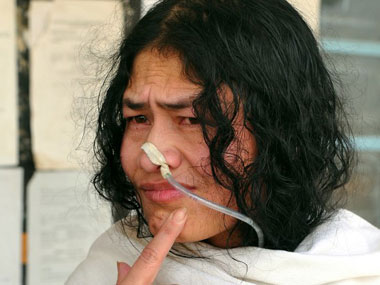The ninth day of August should be a joyous occasion. Today, Irom Sharmila, a symbol of peaceful resistance unlike any in contemporary India, will end her hunger strike, which has been in effect for the last 16 years. For this better part of two decades (where she was kept alive via official force-feeding through a tube), she has sacrificed no less than her entire being to the cause of repealing the brutal Armed Forces (Special Powers) Act (Afspa), 1958 from her state, Manipur. This has been to no avail, and realising the practical futility of her protest, she will now enter politics. Nation-states are not known to bend to the will of one individual’s personal activism. It is unsurprising that, after 16 years, Afspa remains in effect; even if it had been dispensed with, it would not have been due to a sole fast. However, civil society can always react with empathy to stunning acts of courage, like the one in question. More so in the case of those who can wield influence in their respective fields and command public opinion, namely the middle class-up. This was something around which a movement (passing the boundaries of Manipur) could have been built in a relatively apolitical manner. Sadly, the compassion reserved for the likes of Anna Hazare did not extend from Ramlila Grounds to Imphal. [caption id=“attachment_1677035” align=“alignleft” width=“380”] File image of Irom Sharmila. AFP[/caption] The attitude or ignorance towards Sharmila is typical of mainland India, which, all said and done, still barely registers the North East. For this overwhelming majority, 9 August will pass like any other day. Sharmila may not even score a faint blip on the radar of civil society. There is an inherent hypocrisy to what infuriates humans beings. When a man recently threw an unsuspecting dog from a roof, its video immediately went viral and there was (rightly) a spontaneous outpour of indignation from different parts of the country. But Sharmila’s situation is a continuum; it does not occur as one instance, but continues to exist. An act of cruelty can invoke outrage, but to behold repeated cruelty ushers in a certain normalisation. Just as with poverty or caste or Palestine, there seems to be a liberal fatigue about keeping up with the unceasing drone of injustice. Therefore, the passage of time is not directly proportional to the increase in outrage or support. This has slowly dawned on Sharmila, one painful day at a time. We love to create heroes, whether in politics or cinema or sport, but they need to ingratiate themselves within a collective Indian psyche which is fickle and illogical. It is remarkable that more people outside Manipur — ie people not used to scrutinising politics and society — will know about Mary Kom than Irom Sharmila. A cause or feat needs a tamasha around it to really be identifiable. Our empathy needs the trigger of glamour. If big money and material proliferation is what it takes in India to penetrate the national conciousness in a truly national way, then Irom Sharmila T-shirts should be sold from Bengaluru to Delhi. There should be a pellet-spray of films from major production houses aimed at accurately depicting her plight. From cups to coasters to full-length advertisements on the first three pages of The Times of India, her tubed face should stare at the Great Indian Consumer. That, perhaps, will get civil society to appreciate a woman who gave up her best years for a just cause through the sacrifice of her body; a person with no chance of success in a long-overlooked state removed from the consciousness of the liberal elite. In any case, one muted reality will stand: She has done more for the democratic identity of India than all the individuals and institutions across spectra whose mechanical repetition of the word ‘democracy’ has left it limp. Irom Sharmila began her fast when 10 civilians were shot dead in Malom, Manipur, allegedly by the Assam Rifles. Since then, she has constantly been arrested, force-fed, released, and re-arrested in a dull cycle. The charge is attempted suicide. On a level of governance, it may be argued that persisting with savage laws in the face of native discontent could, like with Sharmila, also qualify as attempted suicide. And the same should be relentlessly argued by a general public still insensitive to events outside its proximal interest. Maybe it will be sensitised if Bollywood ever sees business in the North East.
Today, Irom Sharmila, a symbol of peaceful resistance unlike any in contemporary India, will end her hunger strike, which has been in effect for the last 16 years
Advertisement
End of Article


)

)
)
)
)
)
)
)
)



